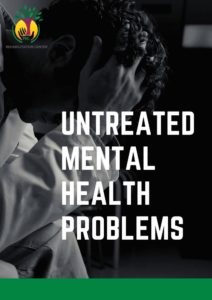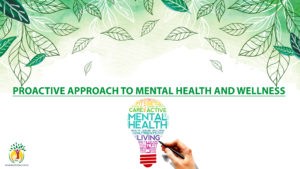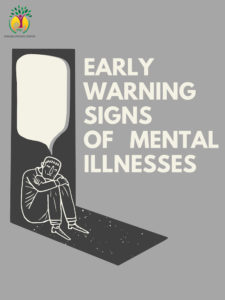Everyone wants to live a healthy and active life but not many people know what actually health is. Health does not only mean an absence of disease. According to the World Health Organization (WHO) “Health is a state of complete physical, mental and social well-being and not merely the absence of disease or infirmity”. Actually, there is no health without mental health treatments. Many people do not have any concept of mental health care; they think that physical health is the only and complete health.

Being mentally healthy is a vital part of overall well-being and good health. According to the World Health Organization, “Mental health is a state of well-being in which an individual realizes his or her own abilities, can cope with the normal stresses of life, can work productively, and is able to make a contribution to his or her community”. If someone is not mentally healthy, she/he can have various issues or can develop mental illnesses or disorders which could be lethal too.
Importance of Mental Health
Good mental health helps us to make better judgments and decisions. It is very much important for healthy relationships and peace of mind. Self-esteem and self-confidence are also influenced by mental health. Being in positive and good mental health helps us achieve happiness and enjoyment in life.
Mental health plays a crucial role in all stages of life. It affects all areas of life. Every parent should be concerned about the mental health of their child as most of the problems related to mental illnesses started to develop from childhood and they emerge as full-blown disorders in adolescence and adulthood.
We could say that good mental health is important as it plays a vital role in our life for the following reasons:
- A person will realize and then utilize his/her full potential/self-actualization.
- Is a productive individual for him/herself, family, and society and for the community
- Is able to cope with life struggles, changes, problems, and stresses.
- Will be able to maintain good and healthy relationships.
- Will be in good health and free from mental illnesses.
- It will also protect you from physical illnesses
- Will be active and energetic
Poor mental health affects people globally. Poor mental health can also lead to addiction and many negative, stressful and problematic consequences. Every 1 person out of 4 is affected by a mental health problem globally. This is an alarming situation. Mental health does not discriminate whether a person is white, black, short, tall, young, or old, it can affect anyone.
Proactive Approach to Mental Health

With the onset of awareness on the rise, we at PRC, encourage people to adopt a more proactive approach to mental health issues. Mental health issues are something we all need to work on to protect and maintain. Being enabled with the right tools and techniques, leave you better prepared and allows you to create a positive and productive environment both at work and at home. It’s not a one-time effort, but rather a constant effort to see what works best for us. Every individual is unique and may need a unique coping strategy that works best for them.
Some of the simple steps that we can include as part of our routines to adopt a more proactive approach to mental well-being can be.
- Be active: Take out time to do some exercise.
- Connect with people: The foundation of mental well-being is strong relationships.
- Keep learning: It is important to keep your brain and mind active.
- Give: It’s a great way to boost your self-esteem and raise a smile.
- Take notice: This means taking the time out for yourself to notice and appreciate what is around you.
Moving on to Mental Illness & everything you should know!

Mental illness is an umbrella term for all of the mental disorders which can be diagnosed by a mental health rehab or professional. It consists of all major and minor mental health problems as well as illnesses/disorders. These include neurosis (anxiety disorders), psychosis (losing contact with reality), or early warning signs which if ignored can become a serious problem.
Mental Disorder is “any condition characterized by cognitive and emotional disturbances, abnormal behaviors, impaired functioning, or any combination of these. Such disorders cannot be accounted for solely by environmental circumstances and may involve physiological, genetic, chemical, social, and other factors. Specific classifications of mental disorders are elaborated in the American Psychiatric Association’s Diagnostic and Statistical Manual of Mental Disorders (DSM–IV–TR; DSM–5) and the World Health Organization’s International Classification of Diseases” as described by the American Psychiatric Association (APA).
Poor health looks like as follows:
- Lack of emotional stability
- Poor concentration and attention
- Lacking decision-making and judgment
- Aggression
- Low self-esteem and confidence
- Easily distracted
- Lethargy
- Unable to cope with daily life problems
- Running from responsibility
- Not satisfied with life
- Pessimism
- Poor memory & relations
- Lacking interest in life
- Blaming others
- Diet and sleep changes
- Unable to cope with changes
- Worrying/stress/anxiety
- Drug and alcohol issues
- Talking very fast or do not talk at all
Early Warning Signs of Mental Illnesses
Each mental illness or disorder has its own signs and symptoms but there are some common behaviors or a sign which denotes that there is some problem or issue with the individual’s mental health. There are some early warning signs that indicate mental health problems; which are as follows:
Early Warning Signs
- Excessive worry/tension/stress/anxiety
- Abnormal fear / uncontrollable fear
- Extreme sad mood or low mood
- Trouble concentrating/focusing
- Confused thinking
- Being very lazy most of the time or extremely very active or euphoric (happiness)
- Sudden mood changes or remains angry most of the time
- Talking excessively or not talking at all / excessive self-talk
- Social withdrawal or isolation
- Change in eating and/or sleeping habits
- Increased nervousness or suspicions
- A lot of self-doubts and a lack of confidence
- Any odd or unusual behavior which is not normal or culturally inappropriate
- Unusual beliefs or illogical thinking
- Feelings of disconnection from the environment or surroundings or with the self
- Memory issues or forgetfulness
- Decreased activities / decreased performance
- Acute sensitivity toward light, sound, or smell
- Irregular speech or speech with no meaning at all
- Loss of energy
- Suicidal ideation or self-harm
The presence of only one of the above-mentioned signs/symptoms does not indicate or guarantee that the person has some mental illness or problem. At least a few of the symptoms should be present for predicting a mental health problem or issue. If any of the symptoms are present then consult a mental health professional immediately.
Taking care of your health is very important for overall well-being and good quality of life. If you or anyone you know is struggling with poor mental health or any mental illness, you can refer them to PRC Clifton Karachi or call 0341-1959599 for more information or guidance.

